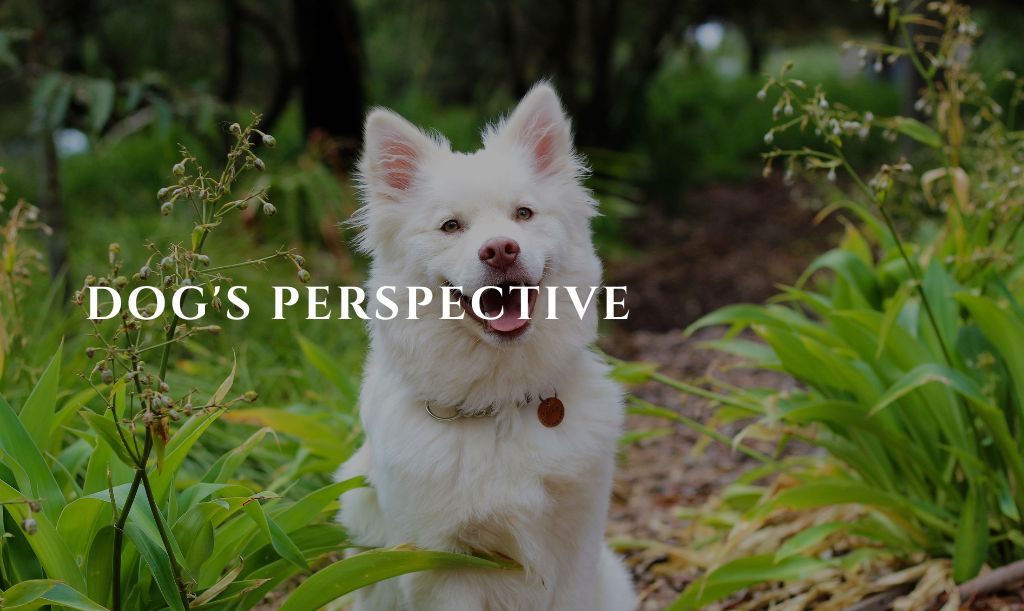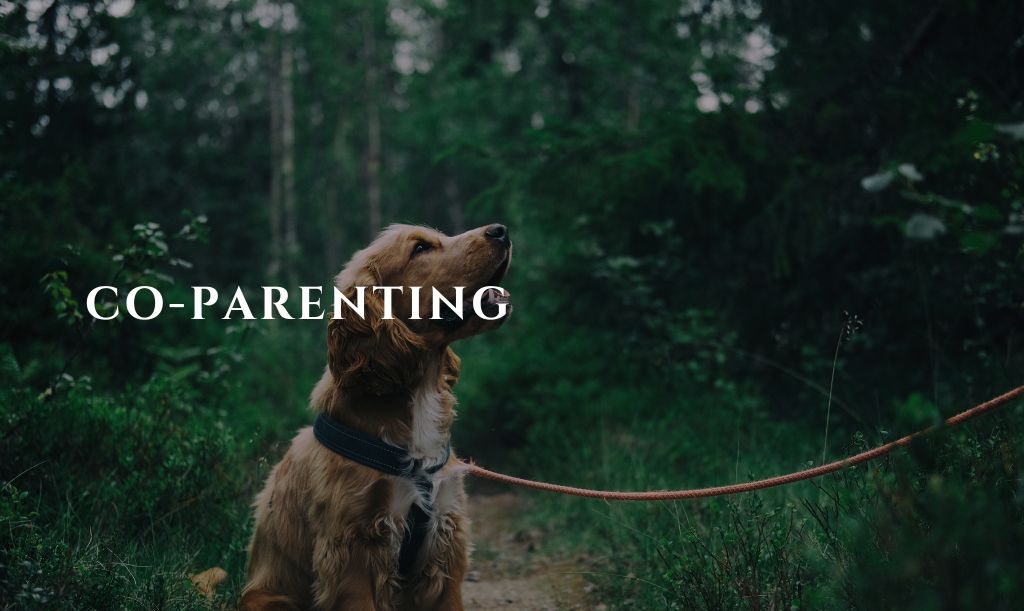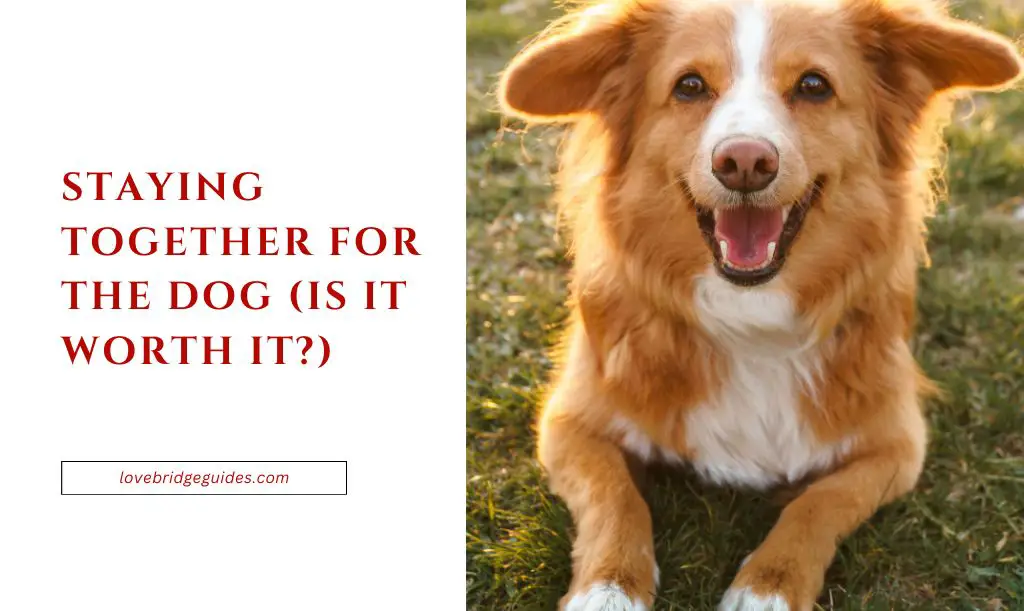Dogs are loyal companions, faithful confidants, and unwavering members of our families.
In this article, we shall dive into the topic of staying together for the dog—an idea that seems to have been forgotten amidst the chaos of human relationships crumbling like feeble sandcastles.
Why should we prioritize keeping our furry friends close? I shall tell you why!
Importance of Staying Together for the Dog
Let me ask you a question: Have you ever witnessed a dog’s heart break?
Have you seen their eyes filled with confusion and sadness when their beloved humans part ways? It is a sight that tears at my very soul!
Dogs thrive on stability and routine; they crave the comfort and security that comes from being surrounded by familiar faces and smells.
When we humans decide to untangle our messy lives and walk separate paths, it is these innocent creatures who bear the brunt of our choices.
Understanding the Dog’s Perspective

Dogs are not solitary creatures; they thrive in social environments.
They have evolved from their wolf ancestors, who lived and hunted in packs.
This pack mentality is deeply ingrained in their nature, making them highly sociable animals.
Dogs seek companionship, not just for survival but also for emotional well-being.
Being part of a pack provides them with a sense of security, belonging, and purpose.
Pack Mentality And The Need For Companionship
In a dog’s mind, their human family is their pack.
They form strong bonds with their human counterparts and consider them as members of their own pack.
Just as humans crave relationships and connection, dogs also yearn for the company of those they consider family.
When dogs are deprived of social interaction or live in isolation, it can lead to various behavioral issues such as anxiety, depression, excessive barking or howling, destructive behavior, and even physical ailments.
Emotional Attachment To Their Human Family
Dogs are known for their unwavering loyalty and unconditional love towards their human family members.
They become emotionally attached to those who provide them with love, care, and attention.
Dogs possess remarkable emotional intelligence; they can sense our moods and feelings even before we express them verbally.
They offer comfort during difficult times and celebrate our joys unconditionally.
For dogs, humans are more than just providers of food; they are sources of emotional support and stability.
Considering these factors from a dog’s perspective is crucial when it comes to making decisions that may affect the well-being of our beloved pets.
We must recognize that they depend on us not only for physical needs but also for emotional fulfillment as well.
Let us not underestimate the profound impact our choices can have on these loyal creatures who give us so much joy and love in return.
The Emotional Impact on Dogs when Families Split Up
When separation or divorce occurs, it can unleash a whirlwind of stress and anxiety upon these innocent souls.
The once harmonious family unit is suddenly torn apart, leaving our dear canines confused and disoriented amidst the chaos.
Their little hearts ache as they witness the dissolution of what they thought was an unbreakable bond.
It’s heart-wrenching to think about how they must feel during this tumultuous time.
Behavioral Changes And Signs Of Distress In Dogs
It’s not just a figment of imagination; dogs do exhibit behavioral changes that serve as glaring indicators of their distress when families split up.
Suddenly, our once playful pups become withdrawn and lethargic.
They may lose interest in activities they used to revel in, such as fetching a ball or going for walks around the neighborhood.
Some dogs may even display aggression or develop destructive behaviors like excessive chewing or digging out of frustration and confusion.
These visible signs signal their internal turmoil, begging us humans to take notice and address their emotional needs.
The Role Of Routine And Stability In A Dog’s Life
Routine is vital for maintaining stability in a dog’s life – it provides them with a sense of security, predictability, and comfort.
When families separate or divorce, this critical stability is disrupted like an earthquake shaking the very foundation on which our furry companions stand.
Their well-established routines are thrown into disarray, leaving them adrift without an anchor to rely on during these stormy times.
Without stable routines encompassing feeding schedules, exercise routines, and bedtime rituals, dogs can become lost and overwhelmed.
They depend on the comforting rhythm of familiarity to guide them through life’s uncertainties; losing that rhythm can have devastating consequences for their emotional well-being.
Benefits of Staying Together for the Dog’s Well-being
Dogs thrive in familiar environments that exude a sense of safety and security.
When couples choose to stay together for the sake of their four-legged companion, they provide a consistent home environment that the dog knows and loves.
By maintaining this continuity, they ensure that their furry friend is not subjected to unnecessary stress or confusion.
Familiar smells wafting through the house, sights of cherished toys scattered across the living room floor, and sounds of laughter echoing through the hallways—it is within this environment that dogs find solace and contentment.
Preserving The Primary Caregiver Relationship
In every dog’s life, there exists an unspoken bond with their primary caregiver—the person who feeds them, bathes them, brushes their fur, and provides endless affection.
This bond transcends mere companionship; it is a relationship built on trust, love, and unwavering loyalty.
Staying together ensures that this vital connection remains intact.
By preserving the primary caregiver relationship within a unified household, we shield our loyal companions from feelings of abandonment or confusion.
We give them reassurance that their main source of emotional support will always be present by their side.
Co-parenting Solutions for Divorced or Separated Couples with Dogs

Divorce and separation can be messy, especially when it comes to dividing assets, but what about the family dog?
It’s crucial to consider the well-being of our furry friends during these tumultuous times.
Shared custody arrangements can provide a solution that allows both parties to maintain a loving and consistent relationship with their beloved canine companion.
By sharing the responsibility of caring for the dog, we ensure that they continue to receive love, attention, and stability from both sides.
Creating A Schedule That Prioritizes The Dog’s Needs
When it comes to shared custody of a dog, creating a schedule should not be taken lightly.
The dog’s needs must be at the forefront of every decision made.
Consistency is key here.
Establishing set visitation times and locations ensures that your furry friend knows what to expect and reduces any confusion or anxiety they may experience due to constantly changing environments.
It is essential that both co-parents are committed to sticking to this schedule diligently.
Open communication between co-parents regarding pet care is paramount in ensuring your dog’s well-being.
From food preferences and dietary restrictions to exercise routines and grooming habits, being on the same page prevents confusion or conflict when it comes to caring for your four-legged family member.
Regularly discussing any changes in your pet’s health or behavior will enable collaboration in providing prompt care if needed.
Setting Clear Guidelines For Training And Discipline
As divorcing or separated couples with shared custody of a dog, one cannot underestimate the importance of setting clear guidelines when it comes to training methods and discipline techniques.
Consistency plays an integral role in shaping a well-adjusted canine companion.
Establishing common rules across households ensures that your furry friend doesn’t get confused by conflicting expectations.
Whether it’s house rules, commands, or boundaries, both co-parents should agree on the training methods used to ensure a harmonious environment for your dog.
This consistency will prevent any behavioral issues from arising due to mixed signals.
The Importance Of Putting Your Dog’s Best Interest First
When it comes to divorces or separations, the emotional turmoil is not limited to just the humans involved.
Our furry companions, who have been loyal and loving throughout our relationship, often become innocent victims caught in the crossfire.
This is where mediation can play a crucial role in resolving disputes about dog custody.
Mediation allows both parties to come together and find a solution that prioritizes the well-being of our beloved dogs.
It provides an opportunity for open communication, where each party can express their concerns and desires regarding the dog’s future.
By focusing on what is best for our canine friends rather than personal grievances, mediation offers a chance to reach agreements that are fair and considerate.
Staying Together For The Dog? Conclusion
Staying together for the sake of your dog should be a top priority when considering separation or divorce.
As social animals deeply connected with their human families, dogs can suffer greatly from disruptions in their lives caused by household changes.
By understanding their perspective and addressing their emotional well-being throughout this challenging time, we can provide them with stability, continuity, and love they need to thrive.
And when disputes arise, seeking mediation to resolve differences can be a compassionate and practical approach that prioritizes the best interests of our furry friends.
Remember, by staying together for the dog, we are not only enriching their lives but also finding a way to maintain the unbreakable bond that brings us immeasurable joy and companionship.
Let’s do what is right for our loyal companions, for they deserve nothing less.
Related Articles:
- https://lovebridgeguides.com/husband-spends-all-his-time-in-garage/
- https://lovebridgeguides.com/moving-out-of-the-marital-bedroom/
- Does A Prom Date Mean Anything? (Answered!) - 20 February 2024
- Boyfriend Refers To Me In Third Person (Explained!) - 20 February 2024
- Is Sending Memes Flirting? Find Out Here! - 20 February 2024


